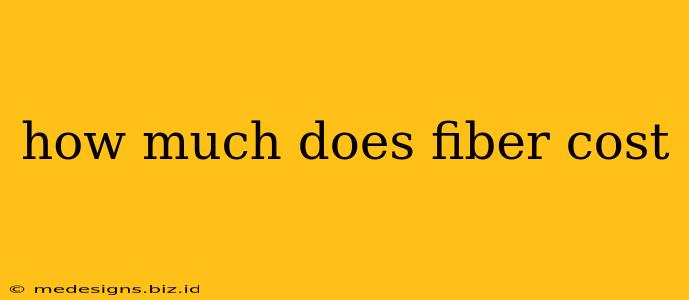How Much Does Fiber Internet Cost? A Comprehensive Guide
The cost of fiber internet can vary significantly depending on several factors. Understanding these factors will help you determine a realistic budget and find the best fiber internet plan for your needs. Let's break down the key elements influencing the price of fiber internet.
Factors Affecting Fiber Internet Costs
Several factors play a crucial role in determining the final cost of your fiber internet service:
-
Internet Speed: Higher speeds generally mean higher costs. Fiber internet offers significantly faster speeds than other connection types, and plans range from basic speeds suitable for casual browsing and email to blazing-fast gigabit options ideal for heavy streaming, gaming, and multiple users. The faster the speed, the more you'll typically pay.
-
Data Allowance: Some providers offer unlimited data, while others might impose data caps. Exceeding your data limit can lead to overage charges, significantly increasing your monthly bill. If you're a heavy internet user, an unlimited data plan is a must, even if it means a higher upfront cost.
-
Provider: Different internet service providers (ISPs) have different pricing structures. Some providers may offer promotional pricing for new customers, while others might have more consistent, higher prices. Comparing offers from multiple providers is crucial to finding the best deal in your area. Consider checking providers like AT&T Fiber, Verizon Fios, Google Fiber, and local smaller providers.
-
Location: The availability and cost of fiber internet can vary drastically depending on your location. Rural areas often have limited access to fiber, resulting in higher prices or slower speeds if fiber isn't available at all. Urban and suburban areas usually have more competitive pricing due to increased availability and competition among providers.
-
Bundled Services: Many providers offer bundled packages that combine fiber internet with television or home phone services. These bundles often offer discounts compared to purchasing each service individually. This can be a cost-effective solution if you need multiple services.
-
Installation Fees: Installation fees can add to the overall cost of getting fiber internet. While some providers may waive installation fees for new customers, others charge a one-time fee for setup and equipment. Always inquire about installation fees upfront to avoid unexpected charges.
-
Contract Lengths: Some providers offer lower monthly rates in exchange for longer-term contracts. However, be aware of early termination fees if you decide to switch providers before the contract expires. Weigh the benefits of lower monthly payments against the potential cost of early termination.
Typical Cost Ranges
While precise pricing is specific to your location and provider, you can expect a general range:
-
Basic Fiber Plans: These usually start around $40-$60 per month for slower speeds and potentially limited data.
-
Mid-Range Fiber Plans: Mid-range plans with faster speeds and unlimited data often fall in the $60-$90 per month range.
-
High-Speed Gigabit Plans: Gigabit fiber internet plans, offering extremely fast speeds, typically cost $80-$120 or more per month.
Tips for Saving Money on Fiber Internet
-
Compare prices from multiple providers: Don't settle for the first offer you see. Research and compare plans from several providers in your area.
-
Look for promotional offers: Many providers offer introductory discounts or special promotions for new customers.
-
Consider bundling services: Bundling internet with television or phone can often result in significant savings.
-
Negotiate: Don't hesitate to negotiate with your provider, especially if you've found a lower price from a competitor.
In conclusion, the cost of fiber internet is variable. By understanding the factors involved and comparing offers, you can find a plan that fits your budget and provides the speed and reliability you need. Remember to thoroughly review contracts and understand all associated fees before signing up.
